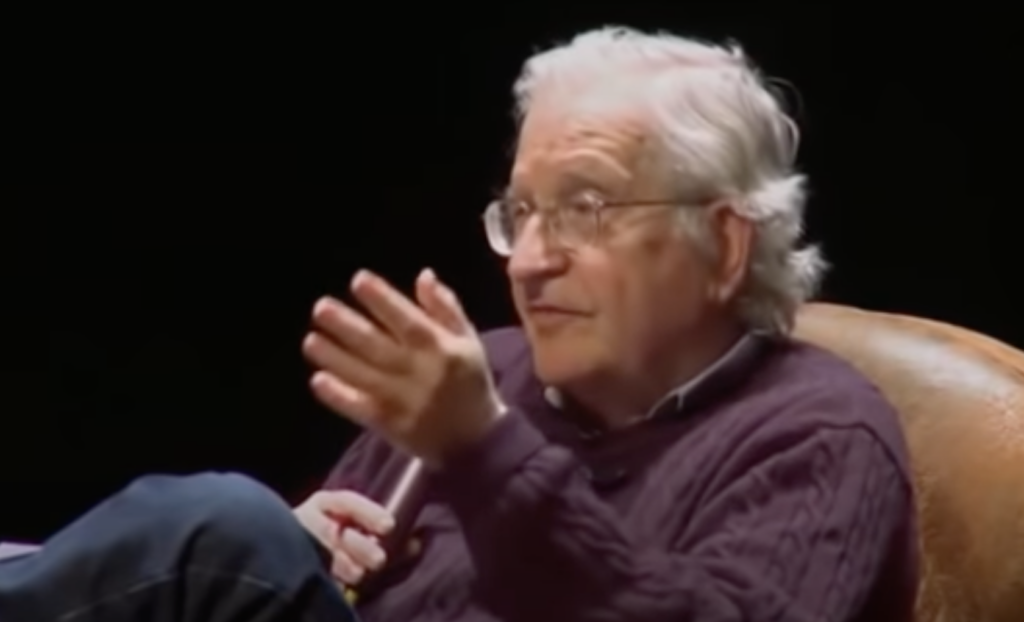Noam Chomsky Explains Why Nobody Is Really a Moral Relativist, Even Michel Foucault

Noam Chomsky made his name as a linguist, which is easy to forget amid the wide range of subjects he has addressed, and continues to address, in his long career as a public intellectual. But on a deeper level, his commentary on politics, society, media, and a host of other broad fields sounds not unlike a natural outgrowth of his specialized linguistic theories. Throughout the past five or six decades, he’s occasionally made the connection explicit, or nearly so, by drawing analogies between language and other domains of human activity. Take the panel-discussion clip above, in which Chomsky faces the question of why he doesn’t accept the notion of cultural relativism, which holds moral norms as not absolute but created wholly within particular cultural contexts.
“There are no skeptics,” Chomsky says. “You can discuss it in a philosophy seminar, but no human being can, in fact, be a skeptic. They wouldn’t survive for two minutes if they were. I think pretty much the same is true of moral relativism. There are no moral relativists: there are people who profess it, you can discuss it abstractly, but it doesn’t exist in ordinary life.” He identifies “a tendency to move from the uncontroversial concept of moral relativism” — that, say, certain cultures at certain times hold certain moral values, and other cultures at other times hold other ones — “to a concept that is, in fact, incoherent, and that is to say that moral values can range indefinitely,” tethered to no objective basis.
If morality is transmitted through culture, “how does a person acquire his or her culture? You don’t get it by taking a pill. You acquire your culture by observing a rather limited number of behaviors and actions, and from those, constructing, somehow, in your mind, the set of attitudes and beliefs that constitutes culture.” He draws a natural comparison between this process and that of language acquisition, which also depends on “having a rich built-in array of constraints that allow the leap from scattered data to whatever it is that you acquire. That’s virtually logic.” And so, “even if you’re the most extreme cultural relativist, you are presupposing universal moral values. Those can be discovered.” When he spoke of “the most extreme cultural relativist,” he was thinking of Michel Foucault?
Back in 1971, Chomsky engaged the French philosopher of power in a debate, broadcast on Dutch television, about human nature and the origin of morality. There he practically lead with linguistics: a child learning to talk starts “with the knowledge that he’s hearing a human language of a very narrow and explicit type that permits a very small range of variation.” This “highly organized and very restrictive schematism” allows him to “make the huge leap from scattered and degenerate data to highly organized knowledge.” This mechanism “is one fundamental constituent of human nature,” in not just language but “other domains of human intelligence and other domains of human cognition and even behavior” as well. Perhaps we do have the freedom to speak, think, and act however we wish — but that very freedom, if Chomsky is correct, emerges only within strict, absolute, wholly un-relative natural boundaries.
Related content:
Michel Foucault and Noam Chomsky Debate Human Nature & Power on Dutch TV (1971)
An Animated Introduction to Michel Foucault, “Philosopher of Power”
Michel Foucault Offers a Clear, Compelling Introduction to His Philosophical Project (1966)
Moralities of Everyday Life: A Free Online Course from Yale University
Based in Seoul, Colin Marshall writes and broadcasts on cities, language, and culture. His projects include the Substack newsletter Books on Cities, the book The Stateless City: a Walk through 21st-Century Los Angeles and the video series The City in Cinema. Follow him on Twitter at @colinmarshall or on Facebook.


